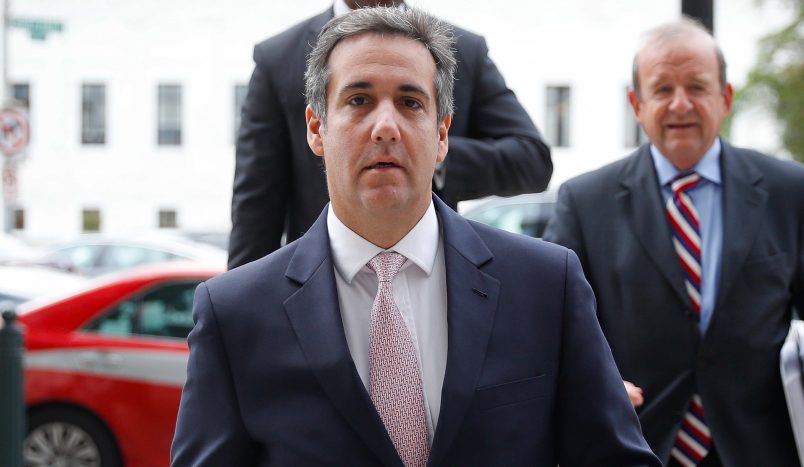It’s not easy to convince a federal judge to view the law enforcement process as biased and illegitimate from the outset. But that’s essentially the case that lawyers for President Trump and Michael Cohen are trying to make before U.S. Judge Kimba Wood.
Through their attorneys, the president and his longtime fixer are claiming that the current atmosphere of “toxic partisan politics” means Justice Department prosecutors can’t be trusted to sort through the reams of material that federal agents seized from Cohen to determine which are covered by attorney-client privilege. Meanwhile, they’re insisting that they aren’t impugning the government’s integrity.
Prosecutors counter that any questions about DOJ’s impartiality are the result of attacks leveled by Trump himself.
In their court filings and oral arguments, Trump and Cohen’s attorneys criticized last week’s raid as overzealous and suggested that Trump’s own Justice Department may be biased against him.
“There is a growing public debate about whether criminal and congressional investigations by the government are being undertaken impartially, free of any political bias or partisan motivation,” Todd Harrison, an attorney for Cohen, wrote in a Monday morning court filing.
Lawyers for Cohen and Trump argue that they should be allowed the “first cut” at perusing the seized material to filter out privileged conversations between the two men. They say typical DOJ protocol, in which a “filter” or “taint” team of prosecutors who are not involved in the case handles that task, will not suffice.
Harrison and Trump attorney Joanna Hendon argued at a hearing Monday that, as Hendon said, there is a “tremendous risk that privileged material may not be recognized as such” by DOJ prosecutors. Both teams have said that the incredible sensitivities involved in a raid on the office of a sitting President’s personal attorney require special treatment.
“The stakes are too high,” Harrison argued.
“The American public is watching,” and partisan attacks are “going back and forth” in the media’s coverage it,” he added.
Harrison repeatedly reiterated that he wasn’t saying the government “did anything wrong.” The issue, he said, is that the situation is just too “combustible.”
Assistant U.S. Attorney Tom McKay said this is a predicament of the defendants’ own making. He pointed out that of the three parties involved in the litigation, only two have made “inflammatory public statements” about the case.
Trump raged last week that the investigation into Cohen represented “a whole new level of unfairness,” calling the raid a “disgraceful situation” and an “attack on our country in a true sense.” And the Cohen case follows a sustained, months-long campaign by Trump to discredit the FBI.
Though Cohen described the agents who conducted the search as “extremely professional,” his attorney, Stephen Ryan, said their actions were “completely inappropriate and unnecessary.”
McKay told the court that the “toxic partisan politics” lamented by Cohen’s team are only furthered by these sorts of remarks, noting that federal agents only secured the warrants after convincing a magistrate judge that they had concrete evidence of Cohen’s criminal conduct.
McKay accused Cohen of trying to “drum up media attention” about his case and then pointing to that attention to try to convince the court to rule in his favor.
Granting “special treatment” to Cohen just because his client happens to be the President of the United States undermines the concerns about the perception of fairness that Cohen and Trump claim to have, McKay said.
Trump’s words have come back to haunt him in court before. Attorneys fighting his ban on immigrants from a handful of majority-Muslim countries; his proposed transgender military ban; and his efforts to phase out the Deferred Action for Childhood Arrivals program have cited the President’s tweets as evidence of his prejudices.
But in this instance, Trump and his longtime fixer are trying to leverage their attacks on the DOJ’s integrity to obtain what prosecutors say is preferential treatment in a criminal investigation directly related to their own business dealings.
Judge Wood, an appointee of President Ronald Reagan, has settled for now on a middle path, allowing both Cohen and the government to sort through the reams of seized material to assess how much of it may be privileged. Though she left open the possibility that an independent special master may have a role in the privilege review, Wood made a point of emphasizing her belief in the scrupulousness of DOJ investigators.
“I have faith in the Southern District U.S. Attorney’s office that their integrity is unimpeachable,” Wood said pointedly as Monday’s hearing wrapped up.
Those comments left the impression that criticizing the DOJ won’t be a winning legal strategy.







“They say typical DOJ protocol, in which a “filter” or “taint” team of prosecutors who are not involved in the case handles that task, will not suffice.”
Well, they’re right about that.
For this job, they’ll need a stench team.
Trump’s jackasses really have no shame.
Prosecutors should counter that any questions about DOJ’s impartiality are illegitimate because they are the result of nonsensical, self-serving attacks leveled by Trump himself.
Law enforcement has a well-known bias against crime.
Trump’s toes are sticking over the edge. He’s staring into the abyss. He doesn’t like the view.